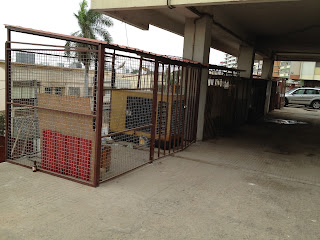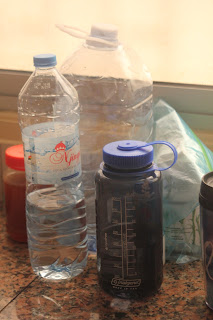Since we don't actually start work until Monday, but have had about a week's experience living here, I thought I'd share the ways we have to adjust to get through the basics of every day living.
Our apartment building
To me, these buildings (the SAME EXACT DESIGN, throughout the city) look like Soviet housing blocs
Yay, generators!
View down the block
We seriously laughed out loud when we saw this down the street
Cost of Living
It never fails to shock people when I tell them that Luanda has been the most expensive city in the world for the last several years; in 2012, it was second only to Tokyo. My stash of American goods that I brought along was limited in size by the insanity of checked-bag fees on international flights. So far, I have paid about $9 for a 4-pack of yogurt; $10 for a box of 50 tea bags; $7 for a quart of soy milk; and $2.50 for 6 eggs. We also pay over $300/month for internet in our apartment. The average cost of a 2-bedroom "luxury" (read: safe for westerners) apartment in Luanda is $6000/month; that is why the 4 of us are sharing this nice, but small 2-bedroom for now.


1 kwanza is about 1 cent, so this is $100, even though it looks like a lot more!
Running Water in Luanda
Public water in our neighborhood, Alvalade, has apparently been out for a few weeks. It's impressive enough to have public piped water in Africa - much less Luanda, a city of 7 million - that it's not surprising to me that it doesn't work that often. We have a guy come fill our tanks about twice per week with enough water to last for cooking, bathing, flushing toilets, etc.
Water tank
It still isn't safe for us to drink, though, so we have to boil the water for 5 minutes, then put it through a filter to get rid of all of the sediment that results.
Filling the pot to boil
Water filter that we brought
In order to get actual water pressure in our faucets, we have to turn on our water pump; however, this can only be turned when the water is going to be used, since it uses so much electricity. 

Magic switch that gives us water pressure!!
We also have a water heater!! So, at least half of the time, we have the potential to have a hot shower WITH water pressure! It's great! To save water as much as possible, we have to take super-fast showers and limit flushing the toilet. This week, we went almost 24 hours without water while waiting for our water guy to make it back to refill the tanks; we had to buy lots of bottled water and take "drip" showers with the little bit that could be squeezed through the system. There are no predictions on when the water might be back, but elections are coming up soon and apparently very little can be done until those are over, so we get to continue with our back-up system.
Electricity!!
When I went to Tanzania as a medical student, there was infrequent access to electricity, so I was surprised and impressed to see the vast, stably-lit skyline of Luanda as we landed at 4am last Saturday. Since that time, we have only had to convert to generator power once, for a couple of hours. I strategically placed flashlights all over the apartment in anticipation of frequent and extensive power outtages; as it turns out, we just have to flip a switch in our circuit breaker box and the generators automatically come on. Then, when city power is back, the generators go out and our power goes out again, so we just flip the switch back.

Generator switch, and circuits - we've only overloaded a circuit once so far
It's an incredibly painless process. We also have A/C units in the living room and bedrooms, which is really nice.
Driving
We have a driver who takes us around, since traffic in this city is crazy and dangerous ("confucao" in Portuguese!). It really feels strange to call a guy any time we want to go somewhere, but we have plenty of shops, restaurants, and things to do within walking distance, which is nice. I would love to take pictures more pictures of the drive around town, and especially of a lot of the beautiful old Portuguese-colonial-style government buildings, but apparently that can get you arrested. So I'm going to hold off on that for now.
Ministry of Health building - shhhh, don't tell them I took this picture!
National HIV/AIDS program office
Language
Portuguese is the official language of Angola. We had lessons before arriving, which were great as a baseline level of knowledge, and between the 4 of us we can usually figure out what is going on when we try to talk to people. Unfortunately, reading comprehension is MUCH easier than understanding spoken language, since our teacher obviously spoke very clearly and slowly for us! We start working in the hospital Monday, so I'm hoping that a combination of immersion in the language with our experience will help us to continue learning. We also hope to get tutors to continue helping us over the next few months.
Clothes drying system devised by our Brazilian landlady
The minimum receommendation is 20L water per person per day...turns out, that's a lot of work!!












love it, Sarah! so cool to see your everyday activities. :)
ReplyDelete